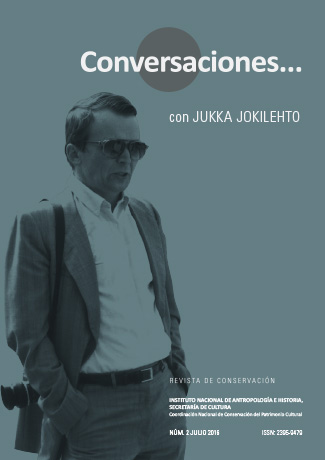Publicado 2017-05-26
Palabras clave
- heritage valuation,
- heritage values,
- heritage impacts,
- economic valuation
Cómo citar
Resumen
This article explores the idea that heritage is historically and socially contingent and is inseparable from the relativistic conception of society and culture. It puts forward the proposition that the concept of values would be more effective, in the theory and practice of heritage conservation and protection, if its use were to be closely related to the ideas of ordering, scaling, preferences and other relativistic procedures, as is done in valuation methodologies and approaches. It explores the monetary approach to heritage valuation. Money is the most simple and direct way to do valuation in our society and, more importantly, it is the simplest way for people to understand the differences of importance in relation to their life today. The adherence to the “moral” principles that heritage should not be “entangled with” the world of commodities is of no assistance in seeking to better appreciate the cultural heritage nor in finding more effective ways to manage its conservation and protection.
Descargas
Referencias
- Allen Consulting Group, The (2005) Valuing the priceless: The value of historic heritage in Australia, Research Report 2,
- Heritage Chairs and Officials of Australia and New Zealand, Sydney.
- Avrami, Erica (2009) “Heritage, values, and sustainability”, In: Alison Richmond and Alison Bracker (eds.), Conservation. Principles, dilemmas and uncomfortable truths, Butterworth-Heinemann & Victoria and Albert Museum, London, pp. 177-183.
- Baghramian, Maria and Adam Carter (2015) “Relativism”, In: Edward N. Zalta (ed.), The Stanford Encyclopedia of Philosophy,
- Winter 2015 Edition [http://plato.stanford.edu/archives/win2015/entries/relativism/], (accessed 17 November 2015).
- Berlin, Isaiah (2002) [1952] Freedom and its betrayal: Six enemies of human liberty, Henry Hardy (ed.), Chatto and Windus, London & Princeton University Press, Princeton.
- Brandi, Cesare (2005) [1963] Theory of restoration, Istituto Centrale per il Restauro (ICR), Nardini Editore, Firenze.
- Campbell, Martha (2003) “Marx’s explanation of money’s functions: Overturning the quantity theory”, Proceedings of the
- conference Marx’s Theory of Money: Modern Appraisals, [https://www.mtholyoke.edu/courses/fmoseley/conference/campbell.pdf], (accessed 14 February 2013).
- Connor, Steven (1994) Teoria e valor cultural, Loyola, São Paulo.
- Council of Europe (2005) Framework convention on the value of cultural heritage for society, Council of Europe Treaty Series,
- Number 199. [http://conventions.coe.int/Treaty/EN/Treaties/Html/199.htm], (accessed 14 February 2016).
- Frondizi, Risieri (1971) What is value? An introduction to axiology,
- Open Court, La Salle.
- Historic England (2016) Listed buildings. [https://historicengland.org.uk/listing/what-is-designation/listed-buildings/], (accessed 21 March 2016).
- Hjorth-Andersen, Christian. (2004) The Danish cultural heritage: economics and politics. Discussion paper 4/33, Institute of
- Economics University of Copenhagen, Copenhagen [http://www.econ.ku.dk/wpa/pink/2004/0433.pdf], (accessed 21 March 2016).
- Jokilehto, Jukka (2016) “Heritage, values and valuation”, Conversaciones. Revista de Conservación, Número 2, pp. 7-18.
- Marx, Karl (1887) [1867] Capital: Volume 1. [https://www.marxists.org/archive/marx/works/1867-c1/ch01.htm], (accessed 17 November 2015).
- Mazzanti, Massimiliano (2002) “Cultural heritage as multi-dimensional, multi-value and multi-attribute economic good: toward a new framework for economic analysis and valuation”, Journal of socio-economics, Number 31, Issue 5, pp. 529-558.
- Muñoz Viñas, Salvador (2005) Contemporary theory of conservation, Elsevier Butterworth-Heinemann, Amsterdam.
- Muñoz Viñas, Salvador (2007) “Pertinencia de la Teoria del restauro”, In: P. Roig et al. (eds.), 17th Interim meeting on conservation training. Jornada internacional “A 100 anni della nascita di Cesare Brandi”, Universidad Politécnica de Valencia, Valencia, pp. 112-133.
- Nijkamp, Peter (2012) “Economic valuation of cultural heritage”, In: Guido Licciardi and Rana Amirtahmasebi (eds.), The economics of uniqueness: Investing in historic city cores and cultural heritage assets for sustainable development, World Bank, Washington D.C., pp. 75-106.
- Oxford English Dictionary (2010) Oxford University Press, Oxford.
- Robinson, Daniel Sommer (2015) “Idealism”, Encyclopaedia Britannica. [http://www.britannica.com/topic/idealism], (accessed 17 November 2015).
- Sánchez Vásquez, Adolfo (1984) Ética, Editorial Critica, Barcelona.
- Smith, Adam (1974) [1776] The wealth of nations, Penguin Books, Harmondsworth.
- Smith, Laurajane (2012) “Editorial”, International journal of heritage studies, Volume 18, Number 6, pp.533-540.
- Throsby, David (2012) “Heritage economics: A conceptual framework”, In: Guido Licciardi and Rana Amirtahmasebi (eds.),The economics of uniqueness: Investing in historic city cores and cultural heritage assets for sustainable development, World Bank, Washington D.C., pp. 45-74.
- UNESCO (1998) Report of the World Heritage global strategy natural and cultural heritage expert meeting, 25 to 29 March 1998, Theatre Institute, Amsterdam, The Netherlands, UNESCO World Heritage Centre, Government of the Netherlands, Paris.
- Wikipedia (2015) “Fuzzy logic”,[https://en.wikipedia.org/w/index.php?title=Fuzzy_logic&oldid=683808263], (accessed 16 October 2015).

